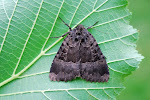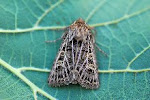"My mothing area lies south of Chiddingfold and almost in sight of the Sussex border. I started trapping a couple of years ago because once the butterflies had disappeared I was faced with several months with nothing to see before they returned with the spring. There is only so much excitement that can be generated by the sight of a solitary Red Admiral on a sunny winter's day.
Exactly a year ago I took 220 Small Quakers (Orthosia crudain) in my Heath trap with a 20w actinic bulb and over 100 in a Robinson. So far this year I've managed to take just 1 in about 10 nights trapping.
Several of the usual suspects have appeared, the micro moth Tortricodes alternella commonly turns up, always making me think that at least one of the specimens taken should be something else and no matter what I do always too lively to pose for a photograph. Maybe for this photo of a Yellow-Horned (Achlya flavicornis) I should have taken a head-on police mug shot but he showed every indication of also wanting to escape.
I have a soft spot for the Brindled Beauty because it is the first moth that I ever photographed in its natural setting and so much more colourful in daylight (Lycia hirtaria)
Small Brindled Beauty (Apocheima hispidaria)
But a more frequent visitor to the trap in January was the Pale Brindled Beauty (Phigalia pilosaria)
There have been a smattering of rather worn Chestnuts (Conistra vaccinii) the darker forms of which tempt me to identify them as Dark Chestnut (Conistra ligula). Maybe I'll be lucky enough to have one of each one night so that I can see the difference in the wing shape. The March Moth (Alsophila aescularia) has appeared in small numbers on several nights.
With a little luck and if the forecast is to be believed I might get another night suitable for trapping before the end of the month and now that the Field Guide to the Micro moths of Great Britain and Ireland has been published as well as the Smaller Moths of Surrey, I almost look forward to a micro moth or two"
John R
Many thanks to local trapper, John, for sharing his brilliant early season catches.
Showing posts with label March Moth. Show all posts
Showing posts with label March Moth. Show all posts
Wednesday, 20 March 2013
Sunday, 26 February 2012
More than I bargained for!
Like others, I've been taking advantage of the very unseasonal weather to pop the moth trap out in the garden. To be honest, I didn't expect to be as successful as I have been, with a total of 15 species recorded (and god knows how many individuals!) over the past 3 days, bringing the 2012 garden moth list to 20... a figure that wasn't reached until 22nd March last year. Perhaps a sign of things to come?
Here's the list so far:
Dark Chestnut
Chestnut
March Moth
Common Quaker
Small Quaker
Clouded Drab
Small Brindled Beauty
Pale Brindled Beauty
Winter Moth
Spring Usher
Tachystola acroxantha
Epiphyas postvittana
Carpatolechia decorella
Ypsolopha ustella
Tortricodes alternella
Amblyptilia acanthadactyla
Emmelina monodactyla
Agonopterix heracliana
Mompha subbistrigella
Acleris cristana
Small Quaker, 1 of 3...
Small Quaker w/ big brother, the Common Quaker...
Spring Usher...
March Moth...
Small Brindled Beauty, the most numerous moth in the trap at present...
Pale Brindled Beauty, a belated garden first...
A gang of 'Beauties'...
Clouded Drab...
Dark Chestnut, a first for the garden...
Carpatolechia decorella...
Mompha subbistrigella...
Emmelina monodactyla...
Here's the list so far:
Dark Chestnut
Chestnut
March Moth
Common Quaker
Small Quaker
Clouded Drab
Small Brindled Beauty
Pale Brindled Beauty
Winter Moth
Spring Usher
Tachystola acroxantha
Epiphyas postvittana
Carpatolechia decorella
Ypsolopha ustella
Tortricodes alternella
Amblyptilia acanthadactyla
Emmelina monodactyla
Agonopterix heracliana
Mompha subbistrigella
Acleris cristana
Small Quaker, 1 of 3...
Small Quaker w/ big brother, the Common Quaker...
Spring Usher...
March Moth...
Small Brindled Beauty, the most numerous moth in the trap at present...
Pale Brindled Beauty, a belated garden first...
A gang of 'Beauties'...
Clouded Drab...
Dark Chestnut, a first for the garden...
Carpatolechia decorella...
Mompha subbistrigella...
Ysolopha ustella...
Emmelina monodactyla...
Not exactly a moth, but the thin crescent of the moon was looking nice on Friday night...
Happy mothing!
Saturday, 25 February 2012
Nice to get some moths!
I trapped a couple of nights ago, and got nothing. Last night was not as warm, but I decided to trap anyway. Amazingly, I got 10 moths (+ a few micros)! Presumably, this is because it took a few nights of warmer temps to persuade moths to hatch out, or leave thier hibernation places. Nothing new for the garden, but some nice species.
.
24th Feb:
3 Chestnut
2 Spring Usher
2 Common Quaker
1 Dotted Border
1 Satellite
1 March Moth
.
Sorry about the ugly black rectangles, but I am using my new laptop, and I haven't got quite used to the photo editing software yet!
.
Spring Usher

Satellite

March Moth

Dotted Border

Common Quaker

Labels:
Common Quaker,
dotted border,
March Moth,
satellite,
Spring Usher
Friday, 25 February 2011
February Moths (Bill's stolen the best title!)
I have attempted to trap three times since the new year, but only got one moth in each. Luckily, one of those was a new species, and I also had a better night last night trapping 7 moths. A couple of weeks ago I managed a lovely Pale Brindled Beauty, and last night I got a March Moth, as well as a Dotted Border which is new for the garden.
 March Moth
March Moth

Pale Brindled Beauty

24th February:
2 Common Quaker
2 Small Quaker
1 March Moth
1 Dotted Border
1 Hebrew Character
.
Dotted Border


Pale Brindled Beauty

Sunday, 20 February 2011
March comes Early
Sorry, I know I can't compete with Sean's title puns, but I gave it my best try!
Over the last few weeks, I've trapped on the 12th and 18th, and although the chilly nights seem to have returned, it doesn't seem to be stopping hardy early species from being on the wing, and I've managed to add 3 species to the garden list.
March Moth- described as generally very common throughout Surrey. In an unusual posture...
Same moth, in its typical posture...
Early Moth- another common species, but a welcome sight...
Hebrew Character- Caught an individual of this early appearing noctuid on 12th, no doubt it will become much commoner as spring arrives!
Subscribe to:
Posts (Atom)






.JPG)
.JPG)


































